Havilah
On this page, you find all documents, package deals, and flashcards offered by seller Havilah.
- 2336
- 0
- 36
Community
- Followers
- Following
42 Reviews received
2369 items
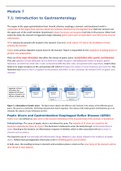
Portage Learning NURS 251 Pharmacology Module 7
Module 7 7.1: Introduction to Gastroenterology The organs of the upper gastrointestinal tract (mouth, pharynx, esophagus, stomach, and duodenum) work in conjunction to first digest food and then absorb the nutrients obtained from the digested food. Both the stomach and the upper part of the small intestines (duodenum) release hormones and enzymes that help in this process. When food enters the body, the stomach is triggered to begin releasing gastric juices such as hydrochloric acid (HCl) a...
- Exam (elaborations)
- • 13 pages •
Module 7 7.1: Introduction to Gastroenterology The organs of the upper gastrointestinal tract (mouth, pharynx, esophagus, stomach, and duodenum) work in conjunction to first digest food and then absorb the nutrients obtained from the digested food. Both the stomach and the upper part of the small intestines (duodenum) release hormones and enzymes that help in this process. When food enters the body, the stomach is triggered to begin releasing gastric juices such as hydrochloric acid (HCl) a...
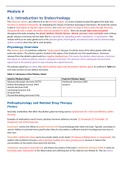
Portage Learning Pharmacology Module 4.
4.1: Introduction to Endocrinology The endocrine system, also referred to as the hormone system, is a series of glands located throughout the body that functions to maintain homeostasis. By modulating the release of chemical messengers (hormones), the endocrine system is able to send signals to regulate organ functions. The endocrine system is unique in that it works through hormones that generally have a longer and slower onset and duration of action. There are actually eight endocrine glan...
- Exam (elaborations)
- • 12 pages •
4.1: Introduction to Endocrinology The endocrine system, also referred to as the hormone system, is a series of glands located throughout the body that functions to maintain homeostasis. By modulating the release of chemical messengers (hormones), the endocrine system is able to send signals to regulate organ functions. The endocrine system is unique in that it works through hormones that generally have a longer and slower onset and duration of action. There are actually eight endocrine glan...
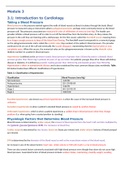
Portage Learning PHARMACOLO NURS 251 Pharmacology Module 3
3.1: Introduction to Cardiology Taking a Blood Pressure Blood pressure is the pressure exerted against the walls of blood vessels as blood circulates through the body. Blood pressure is measured using an instrument called a sphygmomanometer, perhaps more commonly known as the blood pressure cuff. The pressures associated are measured in units of millimeters of mercury (mm/Hg). The health care provider inflates a blood pressure cuff in order to cut off the blood flow from the brachial artery...
- Exam (elaborations)
- • 16 pages •
3.1: Introduction to Cardiology Taking a Blood Pressure Blood pressure is the pressure exerted against the walls of blood vessels as blood circulates through the body. Blood pressure is measured using an instrument called a sphygmomanometer, perhaps more commonly known as the blood pressure cuff. The pressures associated are measured in units of millimeters of mercury (mm/Hg). The health care provider inflates a blood pressure cuff in order to cut off the blood flow from the brachial artery...
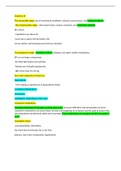
Jersey College, School of Nursing NURS MISC med surg 2 final
The irreversible stage=use of mechanical ventilation, altered consciousness, and profound acidosis. The compensation stage = decreased urinary output, confusion, and respiratory alkalosis. BP normal respirations are above 20 heart rate is above 100 but below 150 serum sodium and blood glucose levels are elevated The progressive stage =metabolic acidosis, lethargy, and rapid, shallow respirations. BP can no longer compensate the MAP falls below normal limits. Patients are clinically ...
- Exam (elaborations)
- • 73 pages •
The irreversible stage=use of mechanical ventilation, altered consciousness, and profound acidosis. The compensation stage = decreased urinary output, confusion, and respiratory alkalosis. BP normal respirations are above 20 heart rate is above 100 but below 150 serum sodium and blood glucose levels are elevated The progressive stage =metabolic acidosis, lethargy, and rapid, shallow respirations. BP can no longer compensate the MAP falls below normal limits. Patients are clinically ...
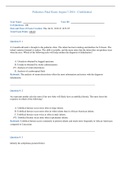
NURS MISC Pediatrics Final Exam
A 2-month-old male is brought to the pediatric clinic. The infant has had vomiting and diarrhea for 24 hours. The infant's anterior fontanel is sunken. The child is irritable, and the nurse notes that the infant does not produce tears when he cries. Which of the following tasks will help confirm the diagnosis of dehydration? A. Urinalysis obtained by bagged specimen B. Urinalysis obtained by sterile catheterization C. Analysis of serum electrolytes D. Analysis of cerebrospinal fluid Rati...
- Exam (elaborations)
- • 35 pages •
A 2-month-old male is brought to the pediatric clinic. The infant has had vomiting and diarrhea for 24 hours. The infant's anterior fontanel is sunken. The child is irritable, and the nurse notes that the infant does not produce tears when he cries. Which of the following tasks will help confirm the diagnosis of dehydration? A. Urinalysis obtained by bagged specimen B. Urinalysis obtained by sterile catheterization C. Analysis of serum electrolytes D. Analysis of cerebrospinal fluid Rati...
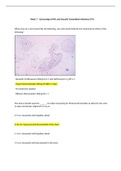
NURSING 633 Week 7- quiz
When seen on a wet mount like the following, clue cells would indicate the treatment by which of the following? Rocephin (Ceftriaxone) 250mg IM x 1 and Azithromycin 1 g PO x 1 Flagyl (Metronidazole) 500mg PO BID x 7 days No treatment needed Diflucan (Fluconazole) 150mg PO x 1
- Exam (elaborations)
- • 14 pages •
When seen on a wet mount like the following, clue cells would indicate the treatment by which of the following? Rocephin (Ceftriaxone) 250mg IM x 1 and Azithromycin 1 g PO x 1 Flagyl (Metronidazole) 500mg PO BID x 7 days No treatment needed Diflucan (Fluconazole) 150mg PO x 1
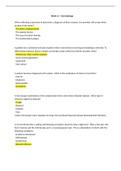
NURSING 633 Week 12- quiz VERY CORRECT
When collecting a specimen to determine a diagnosis of tinea corporis, the provider will scrape which portion of the lesion? The active, leading border The papular lesions The area of central clearing The erythematous plaque A patient has a unilateral vesicular eruption which is described as burning and stabbing in intensity. To differentiate between herpes simplex and herpes zoster, which test will the provider order? Polymerase chain reaction analysis Serum immunoglobulins Tza...
- Exam (elaborations)
- • 14 pages •
When collecting a specimen to determine a diagnosis of tinea corporis, the provider will scrape which portion of the lesion? The active, leading border The papular lesions The area of central clearing The erythematous plaque A patient has a unilateral vesicular eruption which is described as burning and stabbing in intensity. To differentiate between herpes simplex and herpes zoster, which test will the provider order? Polymerase chain reaction analysis Serum immunoglobulins Tza...
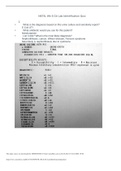
N675L Wk 6 GU Lab Identification Quiz
What is the diagnosis based on this urine culture and sensitivity report? E Coli UTI • What antibiotic would you use for this patient? Nitrofurantoin • List 3 ddx? What is the most likely diagnosis? Nephrolithiasis, cancer, Wilson disease, Fanconi syndrome Most likely is nephrolithiasis due to cystinuria This study source was downloaded by from CourseH on 04-05-2022 13:52:14 GMT -05:00
- Exam (elaborations)
- • 4 pages •
What is the diagnosis based on this urine culture and sensitivity report? E Coli UTI • What antibiotic would you use for this patient? Nitrofurantoin • List 3 ddx? What is the most likely diagnosis? Nephrolithiasis, cancer, Wilson disease, Fanconi syndrome Most likely is nephrolithiasis due to cystinuria This study source was downloaded by from CourseH on 04-05-2022 13:52:14 GMT -05:00
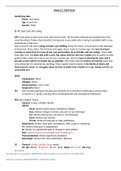
NURSING 633 Week 13- SOAP Note- Jack
Identifying data Name: Jack Jones Age: 6-year old Gender: Male S) CC: Bad Cold; Not eating HPI: It has been 6-years since Jack came to the clinic. He has been followed by a pediatrician who recently retired. Today, Mary decided to bring Jack to you while she is trying to establish with a new pediatrician in the area. Jack arrived in the clinic crying, irritable and sniffling. Mary, the mom, is frustrated as she attempts to feed Jack. Mary states “he has been sick again since I came in...
- Exam (elaborations)
- • 4 pages •
Identifying data Name: Jack Jones Age: 6-year old Gender: Male S) CC: Bad Cold; Not eating HPI: It has been 6-years since Jack came to the clinic. He has been followed by a pediatrician who recently retired. Today, Mary decided to bring Jack to you while she is trying to establish with a new pediatrician in the area. Jack arrived in the clinic crying, irritable and sniffling. Mary, the mom, is frustrated as she attempts to feed Jack. Mary states “he has been sick again since I came in...

NURSING MSN 572Advanced Physical Assessment Across the Lifespan (FNP
NURS 4465 Windshield Survey.N4465 Care of Vulnerable Populations COMMUNITY ASSESSMENT, ANALYSIS, and NURSING INTERVENTION Modules 1-3 (Weeks 1– 3) Assignment Template
Psychiatric Mental Health Nurse Practitioner Clinical Practice Portfolio.
Psychiatric Mental Health Nurse Practitioner Clinical Practice Portfolio.
Was not remotely complete
S.O.A.P. Note Template CASE ID# Tina Jones Neurological